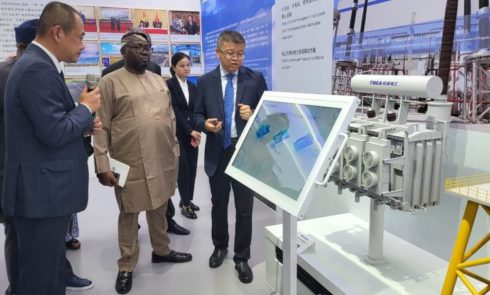The Nigerian government, through the Minister of Power, Adebayo Adelabu, has announced a significant investment of $800 million to improve electricity supply across the nation. This funding is part of the broader Presidential Power Initiative, which aims to modernize and expand the country’s power infrastructure. According to a statement released by the Ministry of Power on Sunday, the funds will be allocated to establish substations and distribution lines, with the goal of enhancing electricity distribution and reliability for millions of Nigerians.
During a recent tour of the TBEA Southern Power Transmission and Distribution Industry in Beijing, China, Minister Adelabu disclosed that the investment would be split equally between two key areas. The first $400 million will focus on the development of substations in regions served by the Benin, Port Harcourt, and Enugu Distribution Companies (DISCOs), classified as Lot 2. The second $400 million will be dedicated to substations and distribution lines in the Abuja, Kaduna, Jos, and Kano DISCOs, under Lot 3. This strategic allocation is expected to address long-standing issues of power shortages and inefficiencies in these areas, ultimately contributing to a more stable and reliable electricity supply across the country.
Progress and Future Goals in Power Generation
Minister Adelabu highlighted the progress made by the current administration in increasing Nigeria’s power generation capacity. Upon taking office, the administration inherited a power output of approximately 4,000 megawatts. However, within a year, the government successfully increased this capacity to 5,170 megawatts, marking an addition of about 1,000 megawatts. While this increase may appear modest, it represents a significant achievement compared to the country’s historical struggles with power generation.
Looking ahead, the administration has set ambitious goals to further boost power generation. By the end of the year, the nigerian government aims to reach a capacity of 6,000 megawatts through a combination of hydroelectric and gas-fired power plants. Moreover, the long-term vision includes generating, transmitting, and distributing 30 gigawatts of power by 2030, with 30% of this energy coming from renewable sources. This strategy aligns with global trends toward sustainable energy and reflects Nigeria’s commitment to reducing its carbon footprint while meeting the growing energy demands of its population.
Enhancing the National Grid for a Reliable Power Sector
In addition to increasing power generation, the federal government recognizes the need to upgrade the national grid to support the country’s growing energy needs. Minister Adelabu emphasized that the current grid infrastructure, given its strength, capacity, and age, is inadequate to support the administration’s vision for the power sector. To address this, the nigerian government has initiated the construction of the Western and Eastern super grids, which are designed to enhance the transmission network, stabilize the grid, and expand the overall capacity and flexibility of the national grid.
Since assuming office, the minister has been working diligently on this project, with full support from President Bola Tinubu. The construction of these super grids is expected to play a crucial role in reducing power outages and ensuring a more consistent and reliable electricity supply across Nigeria. By modernizing the grid, the government aims to create a robust power sector that can support the country’s economic growth and improve the quality of life for its citizens. This initiative marks a significant step toward achieving energy security and sustainability for Nigeria’s future.
Public Outcry Over Power Sector Investment
The recent $800 million inflow into Nigeria’s power sector has stirred diverse reactions among the populace, particularly business owners and residents who are desperate for reliable electricity. With power being a critical element for running businesses and enhancing the quality of life, the investment is seen as a much-needed intervention. However, opinions remain divided as some Nigerians express skepticism about the potential impact of this financial injection. Many wonder if this latest effort will finally address the long-standing issues in the power sector or if it will end up like previous investments, with minimal results.
Bakastine’s Optimistic Perspective
Amidst the mixed reactions, a social media user known as Bakastine has applauded the government’s move, urging others to adopt a more positive outlook. Bakastine highlighted the importance of optimism, especially after the recent elections, stating, “It’s better to use your mind to think positively about the country than always negativity. Let’s begin to use our thoughts and imaginative powers to improve the country, the very same way you use it positively for your life and family. Remain blessed forever.” His comments reflect a sentiment among a segment of the population that believes in giving the new administration a chance to implement its policies before passing judgment.
Concerns Over Previous Investments
Conversely, Adamu Aliyu, another social media commentator, voiced his concerns regarding the efficacy of the investment. Aliyu questioned the impact of previous financial commitments to the power sector, noting, “Despite all the spending, we can’t get 5 hours of light a day. We miss Buhari in terms of power supply.” His statement underscores the frustrations of many Nigerians who feel that despite significant investments, the power supply remains unreliable and inadequate. Aliyu called on the government to ensure that this new investment yields tangible improvements in the power sector.
The Road Ahead for Nigeria’s Power Sector
As the nation waits to see the outcome of this latest $800 million investment, the debate continues on whether the government will finally succeed in revitalizing the power sector. While some Nigerians remain hopeful, others demand accountability and transparency in how the funds will be utilized to ensure that this investment does not follow the pattern of previous, largely ineffective interventions. The future of Nigeria’s power sector, and by extension its economy, hinges on the success of these efforts.
Table of Contents
Discover more from OGM News NG
Subscribe to get the latest posts sent to your email.














